2010届高考一轮复习精编教学案:必修1_Unit2_English_around_the_world(人教新课标)
高三第一轮复习教案高一unit2(人教版高三英语上册教案教学设计)
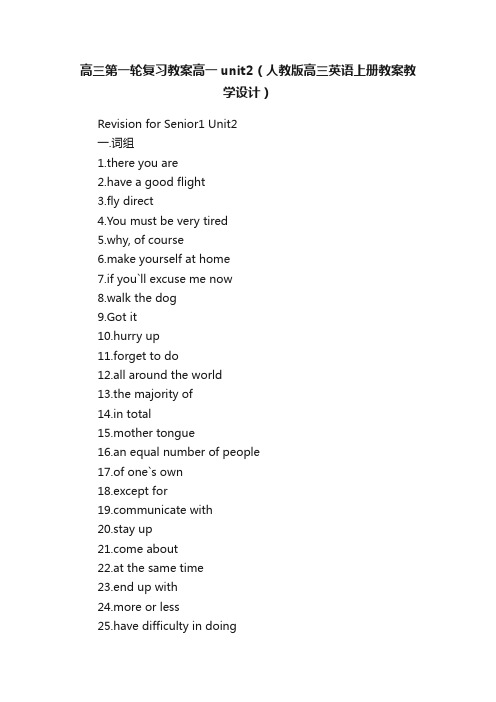
高三第一轮复习教案高一unit2(人教版高三英语上册教案教学设计)Revision for Senior1 Unit2一.词组1.there you are2.have a good flight3.fly direct4.You must be very tired5.why, of course6.make yourself at home7.if you`ll excuse me now8.walk the dog9.Got it10.hurry up11.forget to do12.all around the world13.the majority of14.in total15.mother tongue16.an equal number of people17.of one`s own18.except formunicate with20.stay upe about22.at the same time23.end up with24.more or less25.have difficulty in doing26.over the centuries27.bring in28. a great many29.replace…with二重点语法(一)主谓一致1. Many a student ___ in the exam.A.have failedB. had been failedC. has failedD. will be failed2. Great quantities of fish ______ in the river in the past few days.A. is caughtB. are caughtC. has been caughtD. have been caught3.___ of the land in that district _covered with trees and grass.(2000上海)A.Two fifth…is B.Two fifth…are C.Two fifth s…is D.Two fifths…are4.Every possible means ____ to prevent the air pollution,but the sky is still not clear.(2000上海)A.is used B.are used C .has been used D.have been used5.He is the only one of the students who ____ a winner of scholarship for three years.(2002上海春招)A.is B.are C.have been D.has been6. The company had about 20 notebook computers but only one-third ___ used regularly. Now we have 60 working all day long.(2006浙江)A. isB. areC. wasD. were7. She went to the book store and bought ___.(2006北京)A. dozen booksB. dozens booksC. dozen of booksD. dozens of books8.We always keep ___ spare paper, in case we run out. (2006浙江)A. too muchB. a number ofC. plenty ofD. a good manyAnswers:1.C 2D 3C 4.C 5D 6. D 7D 8C(二)“除……以外”讲解及练习当我们要表示“从整体里减去一部分”,常用except和but。
高三一轮复习必修一unit2 English around the world课件 附知识点真题详解
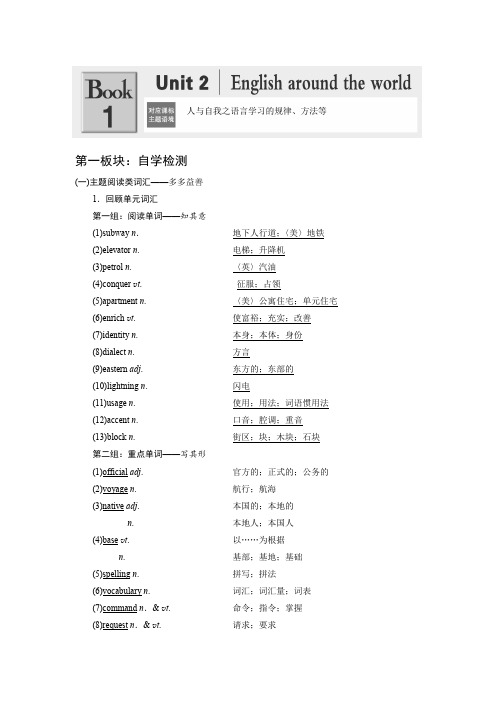
人与自我之语言学习的规律、方法等第一板块:自学检测(一)主题阅读类词汇——多多益善1.回顾单元词汇第一组:阅读单词——知其意(1)subway n.地下人行道;〈美〉地铁(2)elevator n. 电梯;升降机(3)petrol n. 〈英〉汽油(4)conquer v t. 征服;占领(5)apartment n. 〈美〉公寓住宅;单元住宅(6)enrich v t. 使富裕;充实;改善(7)identity n. 本身;本体;身份(8)dialect n. 方言(9)eastern adj. 东方的;东部的(10)lightning n. 闪电(11)usage n. 使用;用法;词语惯用法(12)accent n. 口音;腔调;重音(13)block n. 街区;块;木块;石块第二组:重点单词——写其形(1)official adj. 官方的;正式的;公务的(2)voyage n. 航行;航海(3)native adj. 本国的;本地的n. 本地人;本国人(4)base v t. 以……为根据n. 基部;基地;基础(5)spelling n. 拼写;拼法(6)vocabulary n. 词汇;词汇量;词表(7)command n.& v t. 命令;指令;掌握(8)request n.& v t. 请求;要求(9)straight ad v. 直接;挺直adj. 直的;笔直的;正直的2.拓展主题词汇第一组:学习内容(1)phrase n.短语(2)idiom n.习语;成语(3)pronunciation n.发音(4)grammar n.语法(5)practice n.练习(6)standard n.& adj.标准(的)(7)knowledge n.知识;学问(8)speech n.演讲第二组:学习过程(1)accuracy n. 准确;精确(2)fault n. 缺点;毛病(3)perfect adj. 完美的(4)abundant adj. 大量的;充裕的(5)summarize v t. 概括;总结第三组:学习结果(1)master v t.精通;掌握(2)acquire v.获得;得到(3)overcome v.克服;解决(4)pronounce v t.发音(5)enlarge v t.扩大(6)accumulate v t.积累;积聚(7)improve v.改善;提高(8)grasp v.掌握;领会(二)主题表达类词汇——记牢用对1.活学活用单元词汇(1)actually ad v.实际上;事实上→actual adj.真实的;实际的(2)gradual adj.逐渐的;逐步的→gradually ad v.逐渐地;逐步地(3)latter adj.较后的;后半的;(两者中)后者的→latest adj.最新的;最近的→later adj.后期的;后者的→lately ad v.近来;最近(4)fluent adj.流利的;流畅的→fluently ad v.流利地;流畅地→fluency n.流利;流畅(5)frequent adj.频繁的;常见的→frequently ad v.常常;频繁地→frequency n.频率(6)expression n.词语;表示;表达;表情→express v t.表达(7)recognize v t.辨认出;承认;公认→recognition n.认出[语境活用](1)Enough rest and proper diet have brought back her strength gradually,_and it's really agradual process.(gradual)(2)The puzzled expression on her face suggested that she didn't know how she could expressher feelings properly.(express)(3)He had changed so much that you couldn't recognize him.As a matter of fact, illness andage changed him beyond recognition.(recognize)(4)Mary speaks fluent Chinese while her brother speaks Japanese fluently.(fluent)(5)Frequently going out on a date may result in frequent absence from classes, which willinterfere with their studies.(frequent)2.归类串记“同族”词汇(1)带你一起去“旅行”①voyage n.航行;航海②tour n.(观光)旅行③travel n.旅行④journey n.(长途)旅行⑤trip n.(短途)旅行⑥outing n.远足(2)后缀ial结尾形容词集锦①official官方的②beneficial有益的③commercial商业的④facial面部的⑤initial最初的⑥social社会的(3)en前缀和en后缀改变词性①rich→v.enrich使富裕②able→v.enable使能够③large→v.enlarge使扩大④sure→v.ensure确保;担保⑤strength→v.strengthen加强;巩固⑥short→v.shorten缩短;使变短(三)主题常用短语——厚积素养1.单元短语再现(1)more_than超过;非常;不只是;不仅是(2)come_up 走近;上来;提出(3)be_based_on_ 以……为基础(4)believe_it_or_not 信不信由你(5)play_a_part_(in) 扮演一个角色;参与(6)because_of_ 因为;由于(7)the_number_of ……的数量(8)at_present_ 现在;目前(9)make_use_of 利用;使用(10)such_as_ 例如……;像这种的2.主题短语拓展(1)attend a lecture 听讲座(2)enlarge one's vocabulary 扩大某人的词汇量(3)enrich one's knowledge 丰富某人的知识(4)focus/concentrate one's attention on/upon把注意力集中在……(5)give sb. some advice on 就……给某人一些建议(6)go over one's lessons 复习功课(7)have a good command of English精通英语(8)have difficulty/trouble in doing sth.在做某事方面有困难(9)make an effort to do sth. 努力做某事(10)pick up (偶然)学会;习得[语境活用]从以上短语中选择合适的短语填空(1)I ①attended_a_lecture on how to learn English last night. After the lecture, I was about togo home when it began to rain. Fortunately, there was a person ②coming_up to me with an umbrella and I immediately recognized it was my teacher. I was grateful to her for her kindness. ③Believe_it_or_not,_she is ④more_than our teacher; she is also our good friend.(2)①At_present,_English is ②playing_a more and more important part_in our life; as a result,many people are ③focusing their attention_on learning English. However, we must come across many problems in learning English ④such_as vocabulary and grammar. We should⑤make_an_effort_to ⑥make_use_of every opportunity to practise English so that we caneventually ⑦have_a_good_command_of_it.(四)主题常用佳句——背背增分1.单元句式仿写(1) Native English speakers can understand each other even if they don't speak the same kindof English.[句式解读]even if=even though意为“即使;尽管”,引导让步状语从句。
高考英语复习必修一《Unit 2 English around the world》人教版 PPT

countries in Africa__________South Africa、
A、as for
B、in view of
C、oday the number of people learning English in
China________rapidly、
1、even if/even though引导让步状语从句 Native English speakers can understand each other even if they don’t speak the same kind of English ( 即使他们所讲的英语不尽相同)、 2、one reason why从句/for、、、is that、、、 One reason why (……的一个原因)it is not so easy for a Chinese to speak English is that (是)English has a large vocabulary、
解析: 短语at one’s service表示“随时为……服务”的
意思。
答案: C
3、(天津高考)Don’t respond to any
emails________personal information , no matter how
official they look、
A、searching
5、request (n、& vt、) 请求;要求
7、 straight (adv、) 直截了当;挺直 (adj、) 直的;笔直的;正直的
8 、 base (vt、) 以 …… 为 依 照 ; (n、) 基 部 ; 基 地 ; 基 础 →basic(adj、)基本的;基础的
高中英语必修一(Unit2 English around the world the 2nd period)教案
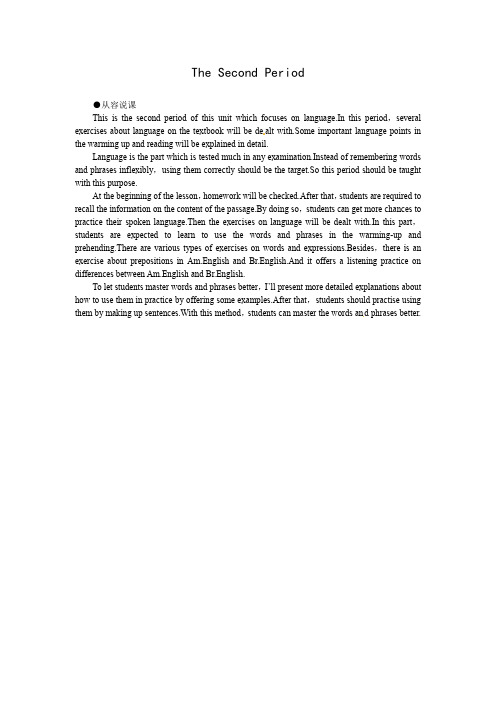
The Second Period●从容说课This is the second period of this unit which focuses on language.In this period,several exercises about language on the textbook will be de alt with.Some important language points in the warming up and reading will be explained in detail.Language is the part which is tested much in any examination.Instead of remembering words and phrases inflexibly,using them correctly should be the target.So this period should be taught with this purpose.At the beginning of the lesson,homework will be checked.After that,students are required to recall the information on the content of the passage.By doing so,students can get more chances to practice their spoken language.Then the exercises on language will be dealt with.In this part,students are expected to learn to use the words and phrases in the warming-up and prehending.There are various types of exercises on words and expressions.Besides,there is an exercise about prepositions in Am.English and Br.English.And it offers a listening practice on differences between Am.English and Br.English.To let students master words and phrases better,I’ll present more detailed explanations about how to use them in practice by offering some examples.After that,students should practise using them by making up sentences.With this method,students can master the words an d phrases better.●三维目标1.Knowledge:Do some exercises to master words and phrases.2.Ability:Learn to use these words and phrases in daily life.3.Emotion:Train students perseverance and patience by remembering new words and phrases.●教学重点Explanation of words and phrases and practise using them.●教学难点How to let student master them well.●教具准备slides●教学过程Step 1 Greetings and revisionGreet the whole class as usual.T:Yesterday we learnt a passage and I asked you to finish the prehending exercises.Who can tell me the answer?S:A,D,C,D,BT:Great!Now who can retell the content of the passage to us?S:Let me try.English is used more and more today.The number of the people speaking it is increasing rapidly.China has the biggest number of English speakers.However,even two native speakers do not speak the same English because there are many kinds of English.That is caused by munication of culture.So actually even they can not understand everything they say.Besides being spoken as the native tongue,English is also used as a foreign or 2nd language in many other countries.In a word,it is more and more important.Step 2 Learning about languageT:You did such a good job.You have mastered the text quite well.This period we will try to master the useful words and expressions in the first period.First let’s do exercise 1 in the part of learning about language.Please read the word or phrase and then match it with the right meaning.(Suggested answer:C D E F A B J G I H)T:Keep these words in mind.And then choose some of them to fill in the blanks in exercise 2.(suggested answer:native,actually,vocabulary,apartment,elevator)T:Now we’ll turn to a difficult one.You should fill in the blanks using the words from warming up and reading.At the same time,you’d better pay attention to the forms of the words.(Suggested answer:includes;culture;present;Actually;phrases;gas;international;rapidly;Actually;government)T:Well done!As we all know,there’re some differences between British English and American English.Can you give me some examples?S:(Ss can present their report on their research yesterday)Suggested examples about differences between Am.English and Br.English in spelling:honoramber(Suggested answers:In Am.English:on;on;of;on;from;on;In Br.English:in;at;to;into;at)T:Excellent.Just now you said that British and American English use different words to express the same meaning.Let’s move to exercise 5 and find out the different words that mean the same.S:sweets and candy;lorry and truck;autumn and fallT:So nice!No w please practise reading them in pairs,paying attention to the sentence stress and intonation.(Practice reading for a few minutes.)Step 3 Language pointsT:Then I’ll explain some useful words and expressions in warming-up and prehending to you.1.include v.(never progressive)if one thing includes another,it has the 2nd thing as one of its parts.包含,包括e.g.The price includes dinner,beds,and breakfast.Durable goods includes such items as cars puters and electrical appliances.including prep.Included adj.(never before nouns)The bill came to $450,including tax.The bill came to $450,tax included.contain v.(never progressive)if sth. contain sth. else,it has that thing inside it or as part ofit.包含;含有;容纳e.g.This drink doesn’t contain any alcohol.There were four or five books containing toys and books.The information you need is contained in this report.container n.容器,集装箱2.play a role 扮演;起作用play (a role/part)as... in...在……中扮演……e.g.Monitor plays an important role in managing a class.The role he played as a hero in that movie won him many prizes.3.the number of... ……的数量(谓语动词为单数形式)a number of...大量的;修饰可数名词The number of homeless people has increased.Huge numbers of animals have died.A large number of problems have been raised.表示“许多”的词语归纳①只能修饰可数名词的有many,a good/great many,a (large/great)number of,many a (+n.)②只能修饰不可数名词的有much,a great/good deal of,a great amount of③可数和不可数均可修饰的有a lot of,lots of,plenty of,a large/great quantity of;quantities of4.even ifeven though 即使He didn’t take her advice,even though he knew it to be true.Even though he has got a good job,he still wants to look for a better one.5.not everythingnot与every,each,both,all,everything,everybody等连用为部分否定,全部否定用no one,none,neither,nothing,nobody,not any等。
冀教版高中英语必修1Unit2English around the world复习教案
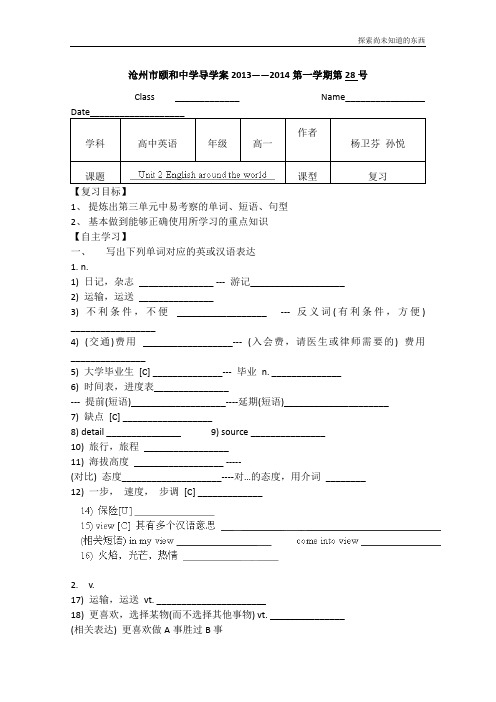
沧州市颐和中学导学案2013——2014第一学期第28号Class _____________ Name________________ Date___________________学科高中英语年级高一作者杨卫芬孙悦课题课型复习【复习目标】1、提炼出第三单元中易考察的单词、短语、句型2、基本做到能够正确使用所学习的重点知识【自主学习】一、写出下列单词对应的英或汉语表达1. n.1) 日记,杂志_______________ --- 游记___________________2) 运输,运送_______________3) 不利条件,不便__________________ --- 反义词(有利条件,方便) _________________4) (交通)费用__________________--- (入会费,请医生或律师需要的) 费用_______________5) 大学毕业生[C] ______________--- 毕业n. ______________6) 时间表,进度表_______________--- 提前(短语)___________________----延期(短语)_____________________7) 缺点[C] __________________8) detail _______________ 9) source _______________10) 旅行,旅程_________________11) 海拔高度__________________ -----(对比) 态度____________________----对…的态度,用介词________12) 一步,速度,步调[C] _____________2. v.17) 运输,运送vt. ______________________18) 更喜欢,选择某物(而不选择其他事物) vt. _______________(相关表达) 更喜欢做A事胜过B事___________________________________; ___________________________________ 19) 劝服,劝说_________________(成功地)劝说某人去做某事__________________________________ 劝说/建议某人去做某事(结果未知)①__________________________ ②___________________________20) 毕业vi. _________________----毕业于…__________________________21) 组织,成立vt. __________________22) 决定,确定vt. __________________ --- 决定去做某事_____________________23) (液体)沸腾,(水)开vi. _______________24) 预报,预测vt. ________________25) 观看,注视,考虑______________3. adj. /adv.26) final (最后的)---- adv. (最后地)________________27) 喜爱的,慈爱的______________---(相关短语) 喜欢,喜爱__________________----你能联想的其他“喜爱”的表达________________________________28) 固执的,顽固的________________29) 坚决的,有决心的__________________--- 一个坚定的眼神____________________________30) 可信的,可靠的__________________二、短语1)自从,自…以后_____________________ 2) 改变主意_____________________________3) 下决心,决定_________________________________ 4) 照常____________________________5) 在午夜___________________________ 6) 梦想做某事______________________7)投降,屈服__________________----- 放弃________________----让步___________________________8) 感觉像,摸起来像,想要_______________________9) 在某个时刻__at one point__10) 陪伴;陪着___________________三. 背诵第二段课文。
2010高三英语复习教案新人教版必修1
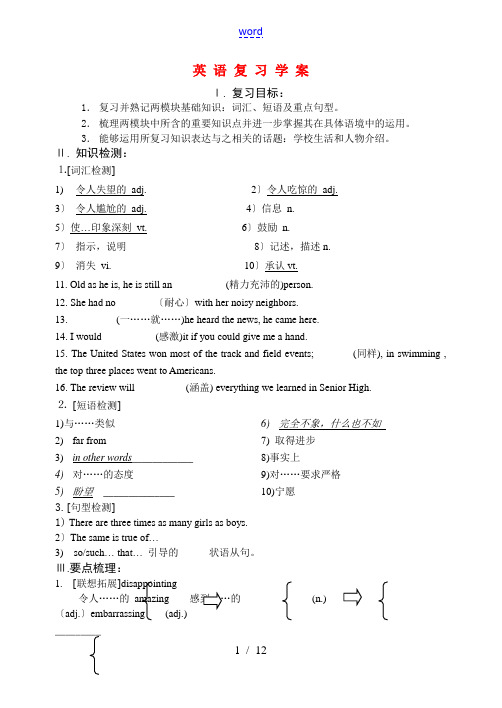
word英语复习学案Ⅰ. 复习目标:1.复习并熟记两模块基础知识:词汇、短语及重点句型。
2.梳理两模块中所含的重要知识点并进一步掌握其在具体语境中的运用。
3.能够运用所复习知识表达与之相关的话题:学校生活和人物介绍。
Ⅱ. 知识检测:⒈[词汇检测]1)令人失望的adj. ____________ 2〕令人吃惊的adj. ____________3〕令人尴尬的adj. ____________ 4〕信息n. ____________5〕使…印象深刻vt. ____________ 6〕鼓励n.____________7〕指示,说明____________ 8〕记述,描述n.____________9〕消失vi.____________ 10〕承认vt.____________11. Old as he is, he is still an __________(精力充沛的)person.12. She had no _______〔耐心〕with her noisy neighbors.13. _________(一……就……)he heard the news, he came here.14. I would __________(感激)it if you could give me a hand.15. The United States won most of the track and field events; _______(同样), in swimming , the top three places went to Americans.16. The review will__________(涵盖) everything we learned in Senior High.⒉[短语检测]1)与……类似_________2)far from __________3)in other words____________4)对……的态度_______________5)盼望______________ 6)完全不象,什么也不如__________7) 取得进步_____________8)事实上_______________9)对……要求严格_____________10)宁愿_______________3.[句型检测]1) There are three times as many girls as boys. _________________________________ 2〕The same is true of…___________________________________3) so/such… that…引导的______状语从句。
2010年高考一轮复习黄金学案――Unit 2 English around the world (必修一)
2010年高考一轮复习黄金学案――Unit 2 English around the world (必修一)【人教新课标】2010年高考一轮复习黄金学案――Unit2 English around the world (必修一)一、语言要点单元要点预览(旨在让同学整体了解本单元要点)词汇部分词语辨析1. voyage/journey/travel/trip/tour2. frequent/common/ordinary/general/regular3. especially/ specially4. a number of / the number of词形变化1. actual adj. 实际的actually adv. 实际上;事实上2. base n. 基地;基础base v. 以……为根据basic adj. 基本的3. east n. 东方eastern adj. 东方的;东部的重点单词1. present n. 礼物adj. 在场的;目前的vt. 赠送2. command n.& v. 命令;指令;掌握3. request n.& v. 请求;要求4. recognize vt. 辨认出;承认;公认5. straight adj.笔直的;正直的adv. 直接;挺直6. block vt. 堵塞;阻碍n. 街区;木块;石块重点词组1. come up走近;上来;提出2. make use of 利用;使用3. such as例如;像这种的4. play a part (in) 扮演一个角色;参与5. because of 因为;由于重点句子1. Why do you think people all over the world want to learn English?2. 状语从句中的省略重点语法直接引语和间接引语(见语法部分)I词语辨析(旨在提供完形填空所需材料)1. voyage/journey/travel/trip/tour【解释】voyage: 去国外或较远地方的海上旅行journey: 指较远的从一地到另一地旅行travel: 一系列的旅程,尤指旅行的概念trip: (短途)旅行tour: 为了公务、娱乐或教育参观多处名胜的旅行【练习】用上面所提供的辨析词的适当形式填空1). It is tiring to take a long _______ by train from Paris to Moscow.2). The _________ from England to Australia used to take several months.3). We’ll have time for a ______ to France next weekend.4). We went on a guided ______ round the castle.答案: 1). journey 2). voyage 3). trip 4). tour2. frequent/common/ordinary/general/regular【解释】frequent经常的,时间或间歇很短的发生或出现common 通常的、常发生的、广泛使用或众所周知的ordinary指种类普通且不能从其他中加以区别的,有时含贬义general黄金。
高中英语 必修1 (Unit2 English around the world the 5th period) 精品教案
高中英语必修1(Unit2Englisharoundtheworldthe5thperiod)精品教案TheFifthPeriod●从容说课Thisisthefifthperiodofthisunit.Inthispart,twoitemswillbedealtwith,thatis,thewordsleftinthevocabulary,thereadingintheworkbook.Thefirstitem,learningnewwordsleftinthevocabularyistoremovethebarrierinthefollowingstudy.Andhowtoletstudentslearnthewords withinterestisadifficultissue.Ithinkitisbettertogivestudentsthechancetolearnnewwordsbythemselves.Letstudentsloo kupwordsinthedictionaryand thencomm unicatewithothersinclass,whichcaninspirestudents.Andthenletthemmakeupsomesentences.Theseconditemisanotherpassageonthesubject “English”.ItgivesstudentsmuchmoreinformationonEnglish.Todealwiththispassage,7stepsaredesigned:(1)predictwhatwillbetalked(2)listentofindoutanswers(3)answerquestions(4)scanningtofillinatable(5)summary (6)discussion(7)homework●三维目标1.Knowledge:Learningtherestwordsinthevocabulary.2.Ability:Theunderstandingofthereadingpassage.3.Emotion:Guidestudentshowtoremembermorewordsassoonaspossible.●教学重点Theunderstandin gofthereadingpassage.●教学难点(1)Howtoletstudentsmasterwords.(2)Howtoletstudentsunderstandthepassagewell.●教具准备cassetterecorder;cardswithwordsonthe m●教学过程Step1GreetingsGreetthewholeclassasusual.Step2NewwordsandvocabularyT:Yesterday,Iaskedyoutolookupthewordsleftinthevocabularyinthedictionary.Haveyoubeenpreparedforit?Now,let’shaveagame.Let’sdividethewholeclassinto2groups.Eithergroupchoosesonestudentasarepresentative.I’llshowther epresentativeawordoraphrase,sheorheshouldexplainitinEnglish.Ifthegroup’smemberscanguessit,yourgroupwillwin10points.Eithergrouphas5chances.Let’sgo!Possibleexplanation:mand:(1)v.totellsb.todosth.(2)anorder2.standard:generallyusedoracceptedasnormal3.playapartin:playarolein4.dialect:awayofspeakingthatisusedonlyinaparticulararea5.request:(1)v.toasksb.todo(2)n.anactofaskingforsth.inapoliteorformalway6.polite:theoppositeofrude7.retell:totellastoryagainorinadifferentform8.accent:awayofsayingwordsthatshowswhatcountry,esfrom9.recognize:toknowwhothepersonis10.eastern:inorfromtheeast ofacountryorplaceT:Welldone!Nowlet’sdealwiththesomeofthewordsandphrasesindeal.mandv.命令,指挥commandsb.todo;commandsth.;博得,应得commandthat-clausee.g.Hecommandedhismantoretreat.ThetroopswerecommandedbyGerneralHaig.Thekingcommandedthatshe(should)beexecuted.(建议,命令,要求一类词后从句中用虚拟语气,此类动词有suggest,advise,order,request,require,command,demand...)Hecommanded thebuilding(should)betorndown.n.命令[C];指挥,控制[U]e.g.Areyourefusingtoobeymycommands?Youmustobeyhiscommandthatthebuilding(should)betorndown.Takecommandof;beincommand;underone’scommand;underthecommandofsb.e.g.Shetookcommandofthisclassaftertheformermanagerleft.Shefeltincommandofherlife.ThebattleshipisunderthecommandofCaptainBlake.2.requestv.requeststh.(fromsb.);requestsb.todo;requestthat-clausee.g.Youcanrequestafreecopyoftheleaflet(宣传单).Youarerequestednottosmokeintherestaurant.Sherequestedthatnoone(should)betoldofherdecision untilthenextmeeting.n.request(forsth.);request(that)e.g.Requestsforvisaswillbedealtwithwithin48hours.Herrequestthatmoresweetsbeservedwasrefused.3.recognize辨认出;意识到;承认recognizesb./sth.(by/fromsth.)通过……认出……;recognizesth.(assth.);把……认作是……recognizethat意识到;承认e.g.Irecognizedthehousefromyourdescription.Drugswerenotrecognizedasaproblemthen.Nobodyrecognizedhowurgentthesituationwas.Werecognizedthatthetaskwasnoteasy.4.standardn.规格,标准[C&U]raise/improve/lowerstandard提高/降低标准set(sb.)astandard给某人定一个标准e.g.Hesethimselfsuchahighstandardthatheoftendisappointshimself.ofhigh/lowstandard具高/低标准的standards行为标准,道德标准amanofhighstandards一个道德高尚的人Step3ReadingT:WehavelearntEnglishformanyyears.Theninyouropinion,whatisaveryimportanthelptoyourEnglishstudy?S:teachers,books,tapes...T:Anythingelse?IsthereanythingthatyoucanturntoforhelpwhenyouareconfusedwhilelearningEnglish?S:Ithinkadictionaryisagreathelp.T:Yeah.Whenwemeetacrossnewwordsweoftenlookthemupinadictionary.Whatisthemostwidely-useddictionaryinChin ese?S:XinhuaDictionary.T:ThenwhichonedoyouthinkisusedwidelyinEnglish?S:I’msorryIhavenoidea.T:It’s LongmanDictionary andthe OxfordEnglishDictionary.Today,we’llreadapassageonthe OxfordEnglishDictionary.Nowaccordingtothetitle,whatdoyouthinkwillbementionedinthepassage?S:Ithinkthewriter,thetimewhenwasitwritten,whyitwaswritten,howitwaswritten,thefeatureofthedictionarywillbementioned.T:Now,let’slistentoittoseewhetheryouranswerisrigh t.(afterlistening)T:Doyouthinkthatyouranswerisright?S:Ithinkthatitdoesn’tmentionthefeatureofthedictionary.T:Yes.Nowlet’sreaditaloudtoanswerthesequestionsthen.①Whywasitwritten?②Whendiditstarttobewritten?③Whoisthewriter?④Howitwaswritten?S:①Toencourageeverybodytospellthesame.②Theideawasraisedin1857.And22yearsl ater,itbegantobewritten.③Threemenworkedtogetheronthedictionary:SamuelJohnson,NoahWebster,andJamesMurray.④Ittookthethreemennearlyalloftheirlivestotrytocollectwords.T:Goodjob!Thenwhofirstbegantoworkonthedictionary?S:Murray.T:Yes.Nowlet’sreadthelastparagraph.AndthenfinishthetableaboutnotesonJamesMurray’slifewithyourpartners.(checktogether)Step4Consolidation/discussionT:Afterreadingit,canyousaysomethingaboutMurray?Let’sdoachainreaction.EachstudentjustsaysonesentenceaboutMurray.T:Doyouthinkitworthsothesepeople’sspendingsomuchtimeon?Why?Nowdiscusswithyourpartnerandlistsomereasons.(discussforabout3minutes)Now,it’sshowtime.S:Wethinkthatitworththeirjob.Iftherewerenodictionaries,peoplewouldhavenoruletoguidethemwhileusingthelanguage,whichwillleadtoamessinEnglishbecausedifferentpeople wouldusedifferentlawstouseit.Thentherewillbemoredifficul tyinunderstandingoneanother.Withthedictionary,peoplehaveasetruletojudgewhethertheirwayofusingthelanguageisright.Step5SummaryandhomeworkToday,wehavelearnedthewordsleftinthevocabularyandwe’vegotsomeinformationonthelargeEnglishdictionary.Afterclass,pleasereadthewordsagainandagaintorecitethemandtrytousethemtomakeupsentences.●板书设计Unit2EnglisharoundtheworldTheFifthPeriodWordsmand2.request3.recognize4.standardUnderstandingofthepassageGuessingQuestions●活动与探究ThisresearchistodoresearchontheconceptoftheOxfordDictionaryandsomeotherkindsofdictionaryinEnglishspok encountries.SostudentsshouldworkingroupstostudytheitemsoftheOxfordDictionaryandfindoutthenamesofothertypenames Themostpopularone ThereasonAbout theOxfordEnglishDictionaryThe OxfordEnglishDictionary istheacceptedauthorityontheevolutionoftheEnglishlanguageoverthelastmillenniu m.Itisanunsurpassedguidetothemeaning,history,andpronunciationofoverhalfamillionwords,bothpresentandpast.Ittracestheusageofwordsthrough2.5millionquotationsfromawiderangeofinternationalEnglishlan guagesources,fromclassicliteratureandspecialistperiodicalstofilmscriptsandcookerybooks.The OED coverswordsfromacrosstheEnglish-speakingworld,fromNorthAmericatoSouthAfrica,fromAustraliaandNewZealandtotheCaribbean.Italsooffersthebestinetymologicalanalysisandinlistingofvariantspelli ngs,anditshowspronunciationusingtheInternationalPhoneticAlphabet.Asthe OED isahistoricaldictionary,itsentrystructureisverydifferentfromthatofadictionaryofcurrentEnglish,inwhichonlypresent-daysensesarecovered,andinwhichthemostcommonmeaningsorsensesaredescribedfirst.Foreachwordinthe OED,thevariousgroupingsofsensesaredealtwithinch ronologicalorderaccordingtothequotationevidence,i.e.thesenseswiththeearliestquotationsappearfirst,andthesenseswhichhavedev elopedmorerecentlyappearfurtherdowntheentry.Inacomplexentrywithmanystrands,thedevelopmentovertimecanbeseeninastructurewithseveral“branches”.TheSecondEditionofthe OED iscurrentlyavailableasa20-volumeprint edition,onCD-ROM,andnowalsoonline.Updatedquarterlywithatleast1000newandrevisedentries,OED Onlineoffersunparalleledaccesstothegreatestcontinuingworkofscholarshipthatthiscenturyhasproduced’(Newsweek).Tofindoutmoreaboutthe OED Online,whynotfollowourfree tour?“Aboutthe OxfordEnglishDictionary”invitesyoutoexploretheintriguingbackgroundanddistinctivecharacterofthe OED.Here,youwillfindin-deptharticlesaboutthehistoryofthe OED,aninsidelookattheprogrammesusedtoenlargeandupdatethe OED entries,little-knownfactsaboutitscontent,andmuchmore.。
2010届高三一轮复习英语第一册精品教案(2)
Unit2 English around the world⊕考纲要求:◆考纲规定的考试范围:重点单词与短语closet; pronounce; broad; repeat; majority; total; equal; situation; trade; international; organization; government; tourism; communicate; exchange; service; signal; tidy; stand; independent; publish; expression; compare.;in total; make oneself at home; except for; stay up; end up with; a great many; the number of; more and more.句型:Thanks Nancy. If you will excuse me now. will 表示意愿的用法With so many people communicating in English everyday,... “wit h+宾语+宾补”的结构做状语Can you tell me how to pronounce...? 带连接副词(或代词)的不定式做宾补的用法At the same time, British English and American English started borrowing words from other languages , ending up with different words. 动名词做状语表结果的用法。
However, most of the time people don’t have any difficulty in understanding each other.In only fifty years , English has developed into the language most widely spoken and used in the world.Except for these differences in spelling, written English is more or less the same .3. 语法:Direct and Indirect Speech(Ⅱ)—祈使句(1)转述他人的请求(2)转述他人的命令◆复习本章要达到的目标1. 掌握majority; total; equal; situation; trade; exchange; compare.;in total; make oneself at home; except for; stay up; end up with; a great many; the number of; more and more.等重点单词及短语的用法。
【知识学习】人教版高中英语必修1教案Unit 2 English around the world
人教版高中英语必修1教案Unit 2 English around the worldUnit2Englisharoundtheworld教学设计课题:Englisharoundtheworld教材分析与学生分析:warmingUp 部分简要介绍了世界英语的分支以及英语语言在不同国家产生的差异,使学生感受英语语言的多文化、多层次、多元性,对英国英语和美国英语的不同有个粗浅的了解;Pre-Reading部分的两个问题引发学生对课文主题的思考,以便参加课堂活动;Reading部分TheRoadtomodernEnglish 简要说明了英语语言的起源、发展变化、形成原因,以及它的发展趋势。
comprehending部分旨在检查学生对课文基本内容的理解程度;LearningaboutLanguage部分主要通过各种练习帮助学生重温本单元前几个部分的所学习的新单词和短语,同时也通过新的例子展现了美国英语、英国英语的差异,并着重介绍了半单元的语法项目(祈使句及其间接引语);UsingLanguage部分中的Readingandtalking主要介绍了当今世界各国各地说英语都有自己的特色,即便是美国东西部、南北部说话均有所不同。
课时安排:Thefirstperiod: Speaking:warmingUpandPre-ReadingThesecondperiod:ReadingTheRoadtomodernEnglishThethirdperiod:ReadingThefort hPeriod:LearningaboutLanguageThefifthperiod:UsingLanguageTh esixthperiod:Listening教学目标:①知识与技能:了解英语在世界上的发展状况,认识各种各样带有民族、地域特色的英语;对英国英语和美国英语的差异有所了解,尤其是一些常用词汇,比如falt和apartment,lift和elevator,rubber和eraser等;掌握本单元中出现的词汇、短语的用法;学会语言交际困难的表达法,如pardon,Ibegyourpardon?;掌握祈使句及其间接引语的表达法。
- 1、下载文档前请自行甄别文档内容的完整性,平台不提供额外的编辑、内容补充、找答案等附加服务。
- 2、"仅部分预览"的文档,不可在线预览部分如存在完整性等问题,可反馈申请退款(可完整预览的文档不适用该条件!)。
- 3、如文档侵犯您的权益,请联系客服反馈,我们会尽快为您处理(人工客服工作时间:9:00-18:30)。
Unit 2 English around the world一、语言要点单元要点预览词汇部分词语辨析1. voyage/journey/travel/trip/tour2. frequent/common/ordinary/general/regular3. especially/ specially4. a number of / the number of词形变化1. actual adj. 实际的actually adv. 实际上;事实上2. base n. 基地;基础base v. 以……为根据basic adj. 基本的3. east n. 东方eastern adj. 东方的;东部的重点单词1. present n. 礼物adj.在场的;目前的vt.赠送2. command n.& v.命令;指令;掌握3. request n.& v. 请求;要求4. recognize vt. 辨认出;承认;公认5. straight adj.笔直的;正直的adv. 直接;挺直6. block vt. 堵塞;阻碍n. 街区;木块;石块重点词组e up走近;上来;提出2.make use of 利用;使用3.such as例如;像这种的4.play a part (in) 扮演一个角色;参与5.because of 因为;由于重点句子1. Why do you think people all over the world want to learn English?2. 状语从句中的省略重点语法直接引语和间接引语(见语法部分)I词语辨析1. voyage/journey/travel/trip/tourvoyage: 去国外或较远地方的海上旅行journey: 指较远的从一地到另一地旅行travel: 一系列的旅程,尤指旅行的概念trip: (短途)旅行tour: 为了公务、娱乐或教育参观多处名胜的旅行【练习】用上面所提供的辨析词的适当形式填空1). It is tiring to take a long _______ by train from Paris to Moscow.2). The _________ from England to Australia used to take several months.3). We’ll have time for a ______ to France next weekend.4). We went on a guided ______ round the castle.答案: 1). journey 2). voyage 3). trip 4). tour2. frequent/common/ordinary/general/regular【解释】frequent经常的,时间或间歇很短的发生或出现common 通常的、常发生的、广泛使用或众所周知的ordinary指种类普通且不能从其他中加以区别的,有时含贬义general一般性的,到处的;不限于领域、地区或应用regular平常的;惯例的;习惯性的、通常的或正常的【练习】用上面所提供的辨析词的适当形式填空1). This is a ___________ problem.2). He often makes ___________ errors of judgment.3).Lo ok at the train’s ___________ schedule.4).The violinist gave a very ___________ performance marked by an occasional memory lapse.5).As a ____________ rule I am home by six.答案: 1). common 2). frequent 3). regular 4). ordinary 5). general3. especially/ speciallyespecially意思是“尤其,特别”,表达事物的不寻常或特别重要specially 指为了某一目的,专门做某事【练习】用上面所提供的辨析词的适当形式填空1). Our city is very beautiful, ___________ in spring. 我们城市很美丽,尤其在春天。
2). He came here ___________ to ask you for help. 他是专程来这里向你求助的。
答案: 1). especially 2). specially4 a number of / the number of【解释】a number of意思是“若干;许多”the number of意思是“……的数目”【练习】用上面所提供的辨析词的适当形式填空1). Today ___________ people learning Chinese in the world is raising rapidly.2). ____________ books in the market are in English.答案: 1). the number of 2). A number ofII词性变化1. actual adj. 实际的actually adv. 实际上;事实上2. base n. 基地;基础base v. 以……为根据basic adj. 基本的3. east n. 东方eastern adj. 东方的;东部的【练习】用括号内所提供词的适当形式填空1) What did he _________ say? (actual)2) The __________ cost was much higher than we had expected. (actual)3)My knowledge of physics is pretty _________. (base)4)She used her family's history as a _________ for her novel. (base)5)This novel is ________ on historical facts. (base)6)He is interested in ________ customs. (determine)7) The wind is blowing from the __________. (determine)答案: 1) actually 2) actual 3) basic 4) base5) based 6) eastern 7) eastⅢ重点词汇1. present n. 礼物adj.在场的;目前的vt.赠送[典例]1). The mountain bike is a birthday present from my parents.这辆山地自行车是父母给我的生日礼物。
2). I am afraid I can’t help you at present. 恐怕现在我没法帮助你。
3). Were you present when the decision was announced? 宣布那项决定时你在场吗?4). In the present case, I advise you to wait. 按照目前的情况,我建议你等等。
5). May I present my new assistant to you? 请允许我向你介绍我的新助手。
[重点用法]make sb. a present of sth.将某物赠送给某人at present/ at the present time目前be present at出席present-day attitudes/fashion现在的态度/流行款式present sb.with sth = present sth. to sb.把某物送给某人[练习] 中译英1). 所有(那些)在场者一眼就看出那个错误。
_______________________________________________________________________________ 2). 这本书是哥哥赠送给我的。
_______________________________________________________________________________ 答案: 1). The mistake was obvious to all (those) present.2). This book was a present from my brother.2. command n.& v. 命令;指令;掌握[典例]1). The officer commanded his soldiers to fire. 那名军官命令士兵们开火。
[重点用法]command sb. to do sth 命令某人做某事be under the command of 由…指挥,由…控制be in command of 控制…be at one’s command 听任某人支配have / take comman d of… 指挥…[特别提醒]command后接that从句时要用虚拟语气[练习] 用适当的介词填空1). For the first time in years, she felt ______ command of her life.2). The army is __________ the king’s direct command.3). The police arrived and took command ________ the situation.答案: 1). in 2). under 3). of3. request n.& v. 请求;要求[典例]1). Your requests will be granted. 你的请求能够获准。
.2). I requested him to help. 我请求他帮忙。
[重点用法]at sb's request/at the request of sb应某人之请求by request (of sb) 应(某人的)请求; 经(某人之)要求:on request 一经要求:request sth (from/of sb)要求, (尤指)请求某人做某事:[练习] 中译英。
1). 我是(特别)应你要求而来。
